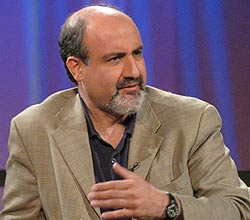Obama wants the Rich and the Poor to Fight amongst Themselves
June 29, 2011
‘Divide and conquer’ seems to be the way to go for a president that, in just one term, has managed to fail on everything.
NationalJournal.com
June 29, 2011
Kids versus corporate jets.
If President Obama’s news conference accomplished anything on Wednesday afternoon, it underscored, in striking tones, his strategy for winning the debt ceiling fight with Republicans: Make it a clash of classes.
- Rich versus Poor.
- Us versus Them.
- Those who support children, food safety, medical research and, presumably, puppies and apple pie versus the rich fat cats who don’t.
In Obama’s world, Democrats are for kids and Republicans are for corporate jets. That is a sharp distinction that could help put the GOP on defensive, but it may not be enough to persuade Republicans to change their posture on the debt-ceiling talks.

The deceiver in chief will blame everyone else before assuming responsibility himself. -The Real Agenda
Republicans have cast Obama as a tax-raiser and a Big-Government spender. This was his jujitsu move to turn their arguments against them. With a hint of disdain, Obama even dredged up the death of Osama bin Laden to score a political point.
“I’ve been doing Afghanistan, bin Laden and the Greek crisis,” Obama said, jabbing Congress for being out of session so much. ”You stay here. Let’s get it done.”
(WATCH: Obama’s Frustration with Congress on Display at Press Conference)
In his first full-scale news conference since March, the president insisted that Democrats had compromised in private talks by agreeing to billions of dollars in budget cuts that would hurt their voters. But, he said, Republicans were refusing to bend by not agreeing to eliminate tax breaks to owners of corporate jets and profit-rich oil companies. If Republicans get their way, Obama said, the end result would be unbalanced deal that lifts the debt limit but forces the government to make deeper-than-necessary cuts.
“If we do not have revenues, that means there are a bunch of kids out there who do not have college scholarships,” Obama said. ”[It] might compromise the National Weather Services. It means we might not be funding critical medical research. It means food inspection might be compromised. I’ve said to Republican leaders, ‘You go talk to your constituents and ask them, “Are you willing to compromise your kids’ safety so some corporate-jet owner can get a tax break?” ‘ ”
Just in case any viewer missed his class-clashing message, Obama referred to corporate-jet owners at least three more times before he took his second question.
This was not the first time Obama has spoken in grim terms about the consequences of cutting too deeply in order to strike a bargain that wins enough votes to raise the debt ceiling. But his rhetoric was sharper, even harsher, than in the past — and it threatens to anger Republican leaders just as he’s supposedly reaching out to them in compromise.
(RELATED: Obama Comes Close to Endorsing Gay Marriage)
Obama is gambling that public pressure will force Republicans to bow to his demand. But Republicans face pressures of their own; the influential tea party movement won’t accept any tax increases and wants draconian budget cuts. Obama’s rhetoric may only back them into a corner.
Normally, the constitutionally pragmatic Obama seeks a middle road in his rhetoric, keeping his options open and burnishing his image as somebody always willing to find a bipartisan solution. Look at his response in the same news conference to a New York law allowing for gay marriages. With liberal activists demanding that he support the measure and make gay marriage a cause of his presidency, Obama demurred. It’s a states-rights issue, he said.
“Each community is going to be different,” Obama said. “Each state is going to be different.”
Obama and GOP leaders in Washington must soon come to grips with the fact that the nation’s sluggish economy will almost certainly take a major hit if Congress doesn’t soon increase the amount of money the U.S. can borrow. Raising the debt limit was once a routine affair, but it’s been caught in the increasingly partisan Washington maw. Republicans are demanding steep budget cuts and no tax increases as the price for a few votes in favor of raising the limit. Obama hopes to save face, as well as some government programs.
“The question now is, are we going to step up and get this done?” Obama said. He knows the answer is yes, and the only question is how.
“Call me naive,” Obama said, “but my expectation is leaders are going to lead.” Obama is naive only if he thinks a single news conference is going to change the political paradigm.

